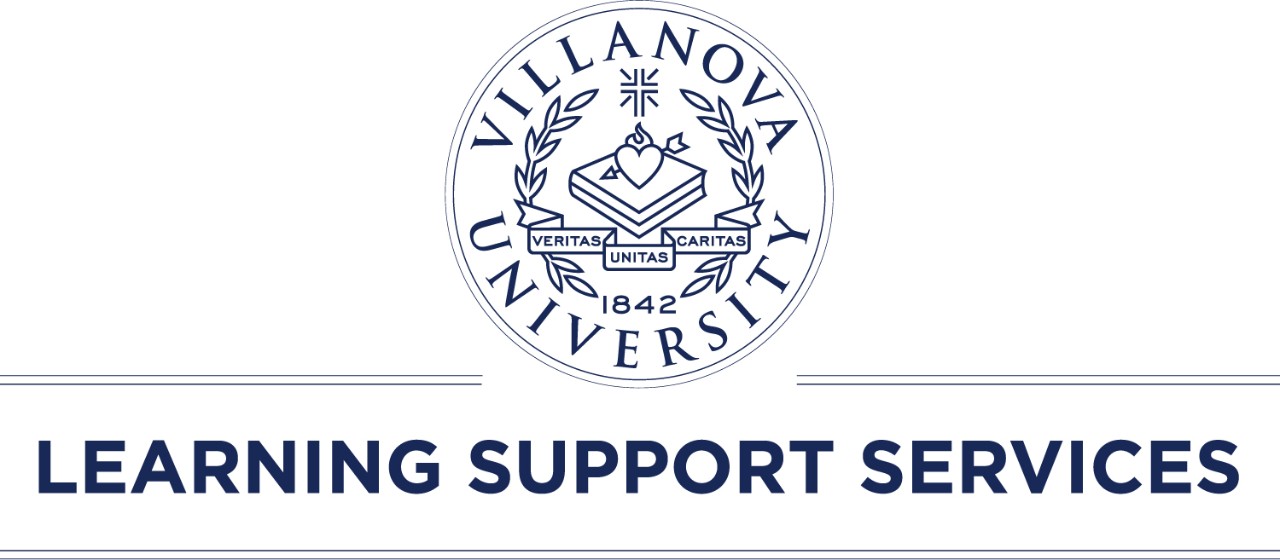Frequently Asked Questions
- How do I obtain accommodations?
- What documentation is needed from a student?
- Who should complete the evaluation for documentation?
- Does Villanova have a program or services for students with documented disabilities?
- What "reasonable academic accommodations" are available for students?
- What is your policy on waivers for foreign language and mathematics?
- Is tutoring provided specifically for students with disabilities?
- What are the most important factors for a student with a disability succeeding in college?
- What are your grievance procedures?
How do I obtain accommodations?
- Students with disabilities must first complete the two-step registration process with LSS to receive accommodations. Step 1: Complete the Online Intake Form through ClockWork and submit your documentation; Step 2: Discuss your accommodation needs with an LSS staff member.
- Once you are registered with LSS and approved for accommodations, complete the Request for Accommodations form in ClockWork. This will enable you to send your professors a copy of your accommodation letter. Students must complete a Request for Accommodations each semester.
Check out our Clockwork Guidelines for additional information.
What documentation is needed from a student?
Documentation needed to determine reasonable accommodations largely depends upon the nature of the disability. Please refer to our Documentation Guidelines to learn more about acceptable documentation. Please note that LSS cannot provide evaluations to students whose documentation is outdated, but we can make suggestions for local resources who conduct evaluations.
Who should complete the evaluation for documentation?
A qualified evaluator should perform testing. For example, clinical or educational psychologists, school psychologists, psychiatrists, and other professionals that are trained in the assessment of specific disabilities in adolescents and adults would be qualified evaluators. It is not considered appropriate for professionals to evaluate family members.
Does Villanova have a program or services for students with documented disabilities?
Learning Support Services (LSS), in conjunction with faculty, provides reasonable accommodations for students with learning disabilities and other neurologically based disorders, and those disabled by chronic illnesses. LSS provides academic support for all undergraduate and graduate students, such as one-on-one academic coaching, study tools videos and workshops that will help you develop strategies and skills around time management, organization, study techniques, test taking strategies, test anxiety, and more.
Students with physical or sensory disabilities and those with temporary disabilities with questions or concerns about access and accommodations should contact the Office for Access & Disability Services.
Although assistance is provided, much of the responsibility for follow through is up to the student. Students who anticipate needing a great deal of structure and support should seriously consider a college with a comprehensive program.
What "reasonable academic accommodations" are available for students?
Reasonable academic accommodations are individual and based on the nature of the disability and the academic environment. Some of the more common accommodations are extended time for tests, note-taking assistance, and access to books in alternate formats. Reasonable accommodations in a postsecondary environment may differ from those available to the student in secondary school. Depending on the nature of the disability and the accommodations requested, the amount of advance notice provided may impact the University's ability to provide accommodations.
What is your policy on waivers for foreign language and mathematics?
Foreign language is a requirement for the College of Liberal Arts and Sciences only. The University policy is not to provide waivers, however students with a significant language disability may petition the Assistant Dean for Undergraduate Students for possible modification of the requirement. Documentation of a language-based disability will need to be on file in LSS. For questions about this process, please contact learning.support.services@villanova.edu.
Students who have struggled with language learning will often find their greatest chance of success when taking a language in isolation, such as in the summer term. If a student has not been recently taking a language in high school, it may be appropriate to postpone fulfilling the requirement during the first year.
The Mathematics requirement varies with the college and major of the student. Many students will have only 1 course to take, and therefore have more flexibility in the type of course to fulfill the requirement. In some majors there are very specific courses required, and almost all of these courses are essential requirements for the particular program and therefore modifications are very rare.
Is tutoring provided specifically for students with disabilities?
All students have access to Tutoring Services on campus. Please contact tutoring-coordinator@villanova.edu to learn about the available tutors or to request a tutor for a specific course.
What are the most important factors for a student with a disability succeeding in college?
- College is difficult, and it can be even more challenging for a student with a disability. Since you will be spending more time on class work than many of your peers, it is important that you choose a major that you like. This will allow you to have greater focus on your work.
- Planning is essential to your success. If possible, take a reduced load of courses your first year. This may help you make the transition to the competitive college environment.
- Many students view college as a fresh start and a time to do things on their own. Due to differences in requirements in high school and college, the strategies that worked in the past may not work now. Seek help early. It is best to be overly prepared in the beginning.
- Get comfortable with your computer. Consider looking at software that might help you with your work, such as Read & Write Gold.
What are your grievance procedures?
Please review the Section 504 Grievance Procedure to view the full grievance policy.

